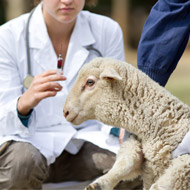
Facility gives vets and farmers easy access to surveillance data
A new surveillance dashboard has been launched by the Animal and Plant Health Agency (APHA), giving vets and farmers easy access to sheep disease data.
Available via the APHA’s Vet Gateway, the dashboard includes an interactive map allowing access to information on a county, country or Great Britain basis.
Users can sort the data by time and age group of sheep. They can also discover the most common diagnoses in their area, or find out where specific diseases have been diagnosed.
“The sheep disease surveillance dashboard provides vets and farmers with a user-friendly means of accessing sheep disease data and enables them to tailor it to their own requirements and interests,” explained Richard Irvine, APHA's veterinary head of scanning surveillance.
“It shows how the diagnostic information captured from scanning surveillance across Great Britain can be shared and contributes to building a national picture of sheep health.”
He continues: “I would encourage both farmers and vets to try the dashboard as well as continuing to help APHA and our disease surveillance partners to protect the livestock industry by sharing information and intelligence about animal disease.”
The dashboard data comes from diagnoses made by APHA’s Veterinary Investigation Centres across England and Wales, from the network of universities and other surveillance centres working with APHA, and from Scotland’s Rural College disease Surveillance Centres.
In a press release, the APHA said that dashboards for other farmed species are now under development. The animal disease surveillance pages on the APHA Vet Gateway have also been enhanced and refreshed.
'These provide a wealth of easily accessible information for vets in practice relating to APHA’s scanning surveillance network and how to access it, related expertise and disease findings,’ it said.



 The latest
The latest